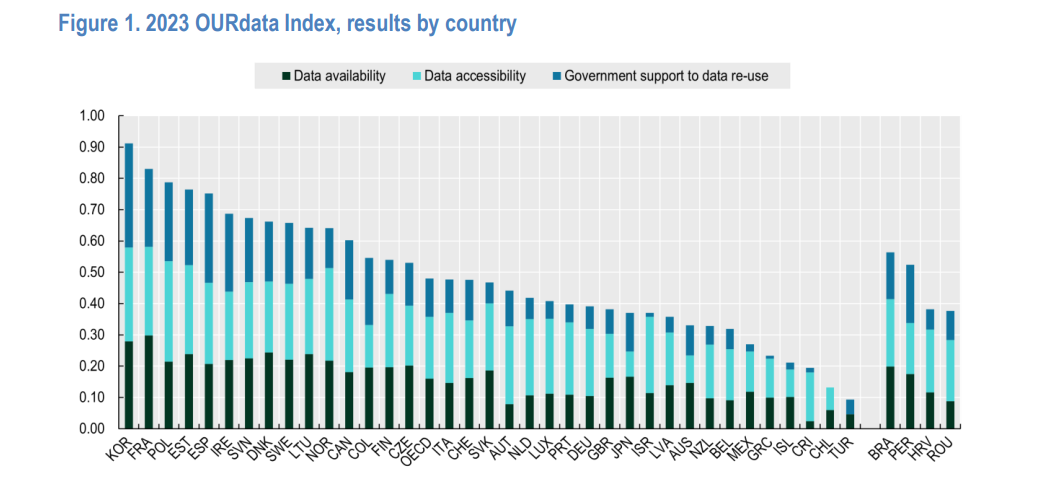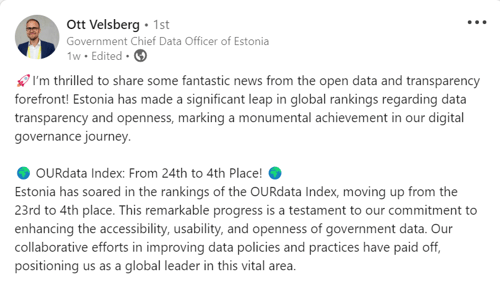OECD: the top performing governments for open data
Open government data is key to addressing both long-standing and emerging policy issues. Events like the pandemic and the ongoing climate crisis have highlighted the need for governments to ensure access to timely, relevant, and high-quality data to foster resilience.
Against the backdrop, the Organisation for Economic Co-operation and Development (OECD) has released the latest findings of its Open, Useful, and Re-usable data (OURdata) Index for 2023, which benchmarks efforts made by governments to design and implement national open government data policies.
Open data efforts are measured using three pillars: data availability (this assesses if a country has an open data strategy), data accessibility (this measures the percentage of high-value open datasets that are accessible through a central open data portal) and government support to data reuse (e.g data promotion initiatives and data literacy programmes).
Data was collected from 36 OECD countries and 4 accession countries throughout 2022. The primary respondents were government officials responsible for data or open government policies. Here's who came out on top - and why:
Top ten
The ten best performing countries (in order) when it comes to open data initiatives are Korea, France, Poland, Estonia, Spain, Ireland, Slovenia, Denmark, Sweden, and Lithuania. These governments score relatively high across all three pillars in OECD’s framework.

Looking at longer term trends, Spain, Ireland, and Slovenia have remained in the top ten since OECD's 2019 results, which demonstrates consistent and sustainable policy efforts. Except for Korea, Norway, Canada, and Colombia, all twelve countries scoring above the OECD average are also EU Member states. The new EU Open Data Directive from 2019, transposed into national laws in 2021, is likely to have contributed to this performance.
Most notable, however, is the rapid rise in ranks from Estonia, Denmark and Sweden, which have gone from below the OECD average in 2019 to well above in 2023 – something the report attributes to a more balanced emphasis on implementation, central governance and improved policies in 2020-2021.
Estonia has moved up from the 23rd to 4th place in this time. Ott Velsberg, Chief Data Officer in the Estonian Government, said enhancing the accessibility, usability, and openness of government data, as well collaborative efforts in improving data policies and practices have clearly “paid off”.

Room for improvement
Digging deeper, there are several areas of improvement to be gleaned when it comes to open data polices overall. For example, OECD countries perform significantly better in the pillars on data accessibility and availability compared to the pillar on government support for data re-use, indicating that more could be done by governments to engage with external stakeholders and potential data users to deliver better policies and services.
OECD said that further efforts are also needed to monitor the impact of open data on public sector performance and the economy and society at large. There are still large gaps between countries in this area; this is possibly due to a lack of international standards and guidance on how to quantify the impact of open data.
Going green
The availability of open green data could be also be further advanced. While relevant data such as geospatial data and mobility data are more often available, the report says the green agenda requires a comprehensive approach spanning across all relevant datasets.
This includes more efforts to ensure that data related to earth observation, environment, and meteorological data, ranging from land use to air quality, is systematically made available in high-quality formats for reuse.
The evolving AI landscape
The fact that countries have shown to improve the quality of open government data will be an important capability in light of advancements in Artificial Intelligence (AI).
OECD said the evolving landscape of AI applications places a premium on the quality of the data it relies upon. Relevant factors here include ensuring data are provided in open, non-proprietary file formats and that they are up to date, which is the case for 80-89% of high-value datasets published as open data by OECD countries.
Areas to improve include metadata quality and API access, which are currently only implemented for around 50% of datasets.





